* You are viewing Posts Tagged ‘Europe’
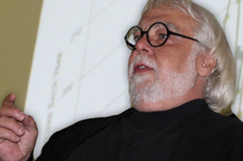
Professor Hatch during his talk.
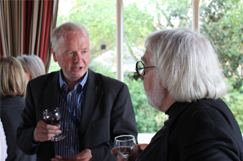
Discussions continue over wine.
In the opening paper of our second seminar series on Thursday 5 May, Professor Robert A. Hatch (University of Florida) got us off to a rousing start with a paper entitled ‘De-Centring the Big Picture: The Scientific Revolution and the Republic of Letters’. In a wide-ranging and suggestive analysis, Hatch argued that correspondence networks were the foremost facilitators of the new science in the early modern period (and vice versa), and for the creation and of vibrant intellectual communities around emergent fields such as astronomy. Compared to printed texts, suggested Hatch, letters were immediate and inclusive, situated the discussion of intellectual themes within the minutia of daily life, and were the primary medium for the gestation and discussion as well as the ultimate dissemination of scientific ideas in this period. The importance of scribal publication as an end in itself throughout the seventeenth century was further emphasized during discussion. Hatch illustrated his talk with a dazzling series of maps and graphs generated from his impressive personal database of scientific correspondences (which includes metadata on the letters of Peiresc, Gassendi, Bouilliau, and many other luminaries), although the necessity of combining quantitative exercises with qualitiative assessments of the formation of epistolary archives was underlined during a lively question and answer session. Seminars take place in the Faculty of History on George Street on Thursdays at 3pm. For future talks in the series, please see the seminar webpage.
James Brown
February 21, 2011
Project Updates, Publications, Websites and Databases
Tags: Bodleian Resources, Europe, France, History of Medicine, Martin Lister, Montpellier, Networks, Seventeenth Century
 In 1663, Martin Lister left his parents’ house in Burwell, Lincolnshire to study medicine in Montpellier. Whilst in France, he kept a journal in an almanac entitled Every Man’s Companion: Or, An useful Pocket-Book (MS Lister 19, Bodleian Library).
In 1663, Martin Lister left his parents’ house in Burwell, Lincolnshire to study medicine in Montpellier. Whilst in France, he kept a journal in an almanac entitled Every Man’s Companion: Or, An useful Pocket-Book (MS Lister 19, Bodleian Library).
Month by month, Lister noted the medical texts he consulted (and the French romances and comedies he read) in this thin octavo, and annotated the recipes given to him when he lodged with an apothecary. He described the personalities and works of luminaries he met in France including William Croone, Nicolas Steno, and John Ray. Lister performed a series of dissections with Steno, as well as going on natural history expeditions with Ray. Lister also attended the salon of Sir Thomas Crew to discuss ornithology, medicine, and literature, mixing with other fellows of Cambridge and English expatriates. As his time in Montpellier was part of his education as a gentleman, Lister made detailed notes about his visits to gardens and libraries in Paris, manufacturing methods, viniculture, literature and drama, and rules of politesse and art connoisseurship.
Dr Anna Marie Roos, our Lister Research Fellow, has recently been awarded a British Academy Small Research Grant to create a textual edition of the pocketbook with appropriate apparatus. To annotate the edition, she will also utilize 25 pages of memoirs of Lister’s time in Montpellier and 43 pieces of Lister’s French correspondence in the Bodleian Library and in France. As the account of Lister’s journey is so detailed, his grand tour and memoirs will also be recreated as an interactive website using maps, images, and texts, providing a virtual introduction to an early modern medical education.
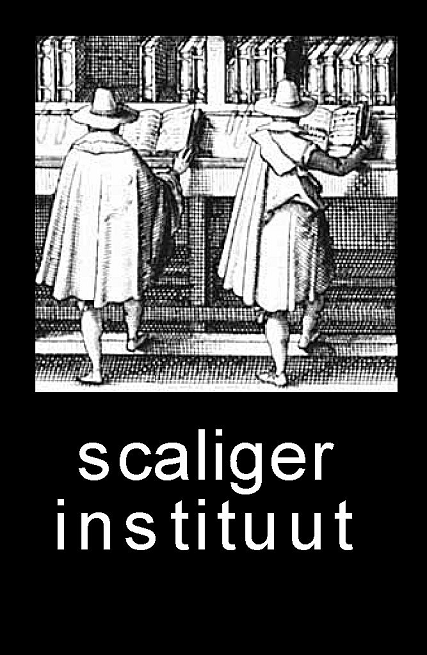
Scaliger Instituut
The Scaliger Institute and Brill publishers invite scholars and researchers to send in proposals for the 2011 Brill Fellowship at the Scaliger Institute of Leiden University Library.
Brill, the oldest scholarly publishing house in The Netherlands based in Leiden since 1683, is sponsoring the Scaliger Institute for the period 2006-2012. This contribution provides an opportunity for one or two fellows to come to Leiden University Library each year in order to do research in the library’s rich Special Collections.
The Brill fellowship is intended for a minimum period of three months. The allowance, which is intended to cover the costs of accommodation and research, is €1000 per month. Applications can be submitted by mail and post to the board of the Brill fellowship.
The prospective fellow must be involved in one of the following main subject areas of Brill: Middle East and Islamic Studies; Asian Studies; Medieval and Early Modern History; Biblical and Religious Studies; Ancient Near East and Egypt and Classical Studies. The Brill fellow is expected to contribute to the activities of the Scaliger Institute and to give a public lecture. When the occasion arises, the lecture will be published by Brill in association with the Scaliger Institute.
The closing date for applications of the Brill fellowship 2011 is 31 January 2011. For more information and the application form, visit the Fellowship website.
James Brown
October 12, 2010
Conferences and Workshops, Events, Project Updates
Tags: Communication, Encyclopaedism, Europe, History of Science, Jan Amos Comenius, John Aubrey, Millenarianism, Networks, Pansophia, Samuel Hartlib, Seventeenth Century, Universities
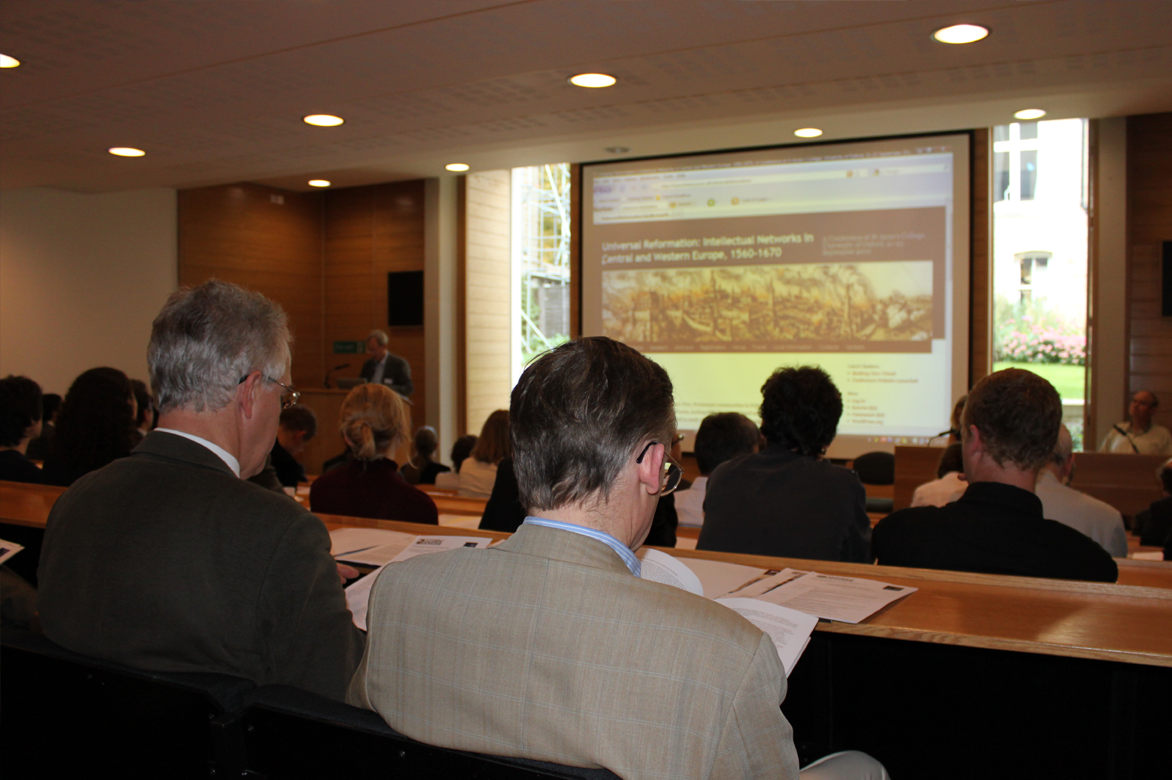
The opening plenary session.
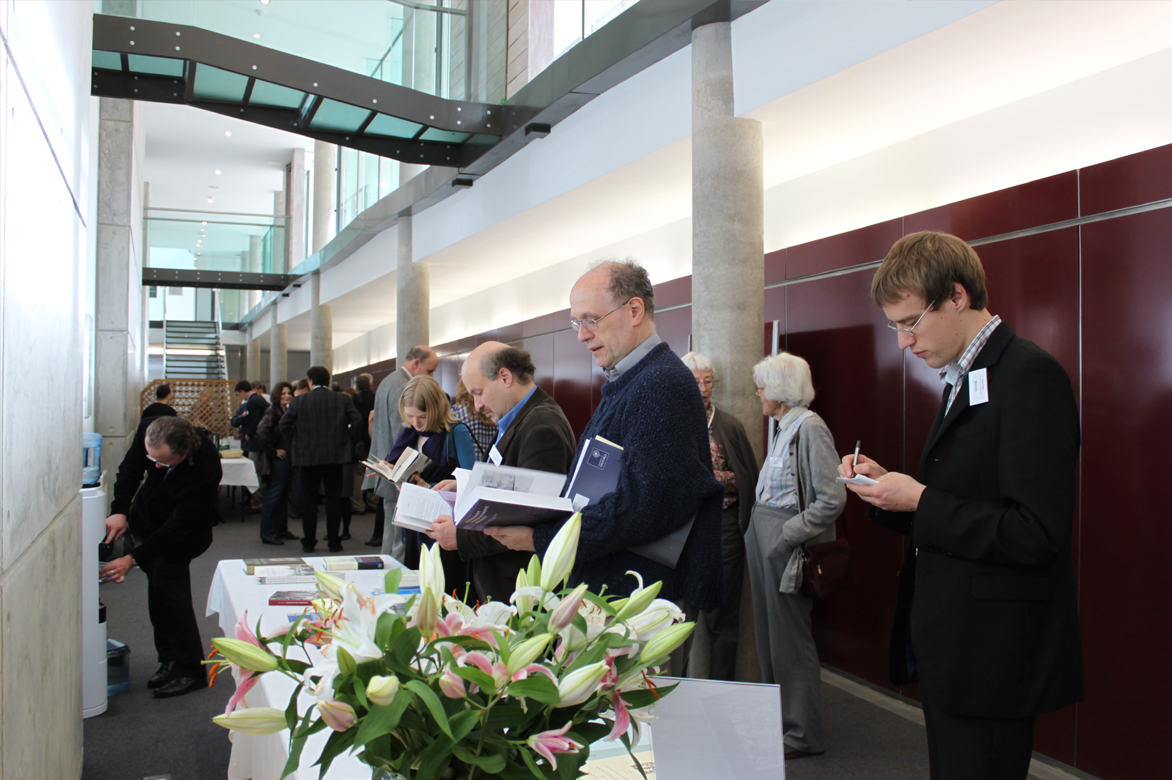
Relaxing in the foyer.
The Project’s inaugural conference, Universal Reformation: Intellectual Networks in Central and Western Europe, 1560-1670, took place at St Anne’s College on 21–23 September 2010. The event, which was attended by over ninety delegates, built on three preparatory European workshops (held in Prague, Cracow, and Budapest), and allowed forty-two emerging and established scholars from eleven countries to share their perspectives on the international networks and intellectual traditions brought into being by the upheavals of the Thirty Years War. Themes explored included institutional networks and intellectual exchange, encyclopaedia and pansophia, the early modern European media revolution, ecclesiastical reconciliation, and millenarianism, prophecy, and propaganda. Delegates also enjoyed a drinks reception in the Bodleian Library‘s historic Divinity School (incorporating a private viewing of the exhibition ‘My Wit was Always Working’: John Aubrey and the Development of Experimental Science), and were present for the prototype launch of our union catalogue. For further information, including speaker profiles and abstracts, please visit the conference microsite; for details of our 2011 event, please visit the conference webpage.
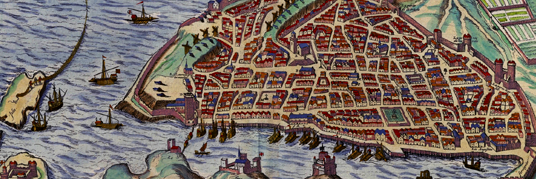
Marseille in 1575. View sourced from Historic Cities.
In the eighth and final installment of the Project’s inaugural seminar series on Wednesday 23 June, held in conjunction with the conference John Selden (1584–1654): Scholarship in Context, Professor Peter Miller (Bard Graduate Center) delivered a wide-ranging overview of ‘Peiresc’s Mediterranean Merchant Network’. Focusing on the letters sent by the polymath from Marseille in the early seventeenth century, Miller elaborated a fascinating story of ‘Peiresc and the sea’ in four parts (which focused respectively on Marseille, space and time in the Mediterranean, merchants, and names). The small, fast nature of Marseillaise ships, especially compared to Venetian craft, meant that letters dispatched from the French port arrived at their destinations quickly (reaching Leiden, for example in fifteen days), and Peiresc’s epistolary activities in the Mediterranean were reliant on an extensive maritime network of non-elite merchants, captains, and sailors, whose identities are in many cases painstakingly recorded (along with other names and biographies) in the letters themselves. This means that it is possible to reconstruct this particular correspondence ‘cloud’ (in Miller’s phrase) in particular detail, and during discussion he provided us with a tantalising glimpse into his forthcoming digitisation initiative which will both visualise Peiresc’s Mediterranean network and link it in an innovative way to an online monograph. For past lectures in the series, please see the seminar webpage; details of the 2011 series will be available shortly.
James Brown
July 16, 2010
Conferences and Workshops, Events, Project Updates
Tags: Communication, Encyclopaedism, Europe, Jan Amos Comenius, Networks, Pansophia, Politics, Religion, Samuel Hartlib, Seventeenth Century
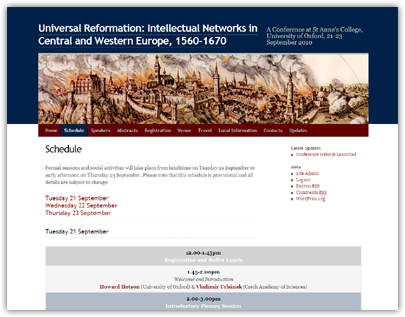 We are pleased to announce that booking is now open for ‘Universal Reformation: Intellectual Networks in Central and Western Europe, 1560-1670’, the first Project conference, which will take place at St Anne’s College, Oxford, on 21-23 September 2010. Organised by Howard Hotson and Vladimír Urbánek, the event will showcase the work of a diverse group of emerging and established scholars, many from east central Europe, who will converge on the intellectual networks and traditions engendered by the upheavals of the Thirty Years War. For provisional programme information, a steadily growing lists of speaker profiles and abstracts, and to book online, please see the new conference website. The deadline for registration is Friday 10 September.
We are pleased to announce that booking is now open for ‘Universal Reformation: Intellectual Networks in Central and Western Europe, 1560-1670’, the first Project conference, which will take place at St Anne’s College, Oxford, on 21-23 September 2010. Organised by Howard Hotson and Vladimír Urbánek, the event will showcase the work of a diverse group of emerging and established scholars, many from east central Europe, who will converge on the intellectual networks and traditions engendered by the upheavals of the Thirty Years War. For provisional programme information, a steadily growing lists of speaker profiles and abstracts, and to book online, please see the new conference website. The deadline for registration is Friday 10 September.



 In 1663,
In 1663, 





 Join
Join 